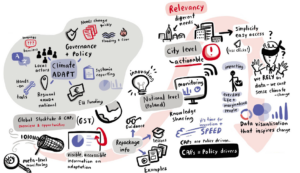Adaptation Networks, Partnerships, Alliances and Platforms are Collaborative Approaches to Moving Widespread Knowledge Exchange and Eventually Science-Informed Plans and Strategies Forward

In the face of complex global challenges posed by climate change, innovative solutions demand a paradigm shift in our approaches. Solutions require new ways of working, thinking, and acting. One of the solutions are new ways of collaboration via networks, partnerships, alliances and platforms. A wide range of these organizational models has emerged over the last two decades. Networks play a pivotal role in fostering collaboration and information exchange among diverse stakeholders (Calliari et al. 2019). They enable governments, organizations, and communities to connect, share best practices, and coordinate efforts for more efficient and effective climate action (Muccione et al. 2019).
PlanAdapt recognises that the scope and scale of the global challenges we face today require collaboration across sectors and institutions bringing together actors from science, policy and practice and therefore, we are linked into important networks and initiatives in our areas of work.
 A considerable number of platforms with regard to climate adaptation have emerged. Such platforms provide access to relevant, high-quality information that is essential for policymakers and practitioners to identify and implement actions to adapt to changes that are here and those changes that are on the horizon. These platforms have proven to be important governance tools for supporting knowledge brokering, awareness raising, capacity building and cross-level coordination, ideally supporting processes that culminate in the development of national and transnational adaptation plans and strategies.
A considerable number of platforms with regard to climate adaptation have emerged. Such platforms provide access to relevant, high-quality information that is essential for policymakers and practitioners to identify and implement actions to adapt to changes that are here and those changes that are on the horizon. These platforms have proven to be important governance tools for supporting knowledge brokering, awareness raising, capacity building and cross-level coordination, ideally supporting processes that culminate in the development of national and transnational adaptation plans and strategies.
Furthermore, they are increasingly expected to keep pace with the growing and evolving needs of their users and the ever-expanding wealth of knowledge, data and evidence on related subjects. Keeping up to date with user needs will require widening the focus to include issues such as well-being, climate risk, capacity building, equality and justice, and place-based and systemic development.

Technical capacity will need to grow to deliver the data and information consistent with evolving user requirements and capabilities, and with advances in science and communication. New innovations, such as interactive and immersive technologies, can be incorporated to enhance the accessibility of information, and to provide relevant and usable tools, maps, infographics and capacity-building experiences for users. Community knowledge-exchange activities are particularly useful when piloting and demonstrating such innovations.
In 2023 and 2024, PlanAdapt supports the United Nations Environment Programme and its team that manages and facilitates Global Adaptation Network (GAN) in accelerating successful climate action. The Global Adaptation Network (GAN) is helping the world to build resilience towards climate change by spreading adaptation knowledge. A growing number of organisations and research institutes are hastily assessing how humanity can best prepare for increasing climatic extremes. The Global Adaptation Network acts as an umbrella system across the world, linking these various organisations, many of which bear a focus towards the regions most vulnerable to the impacts of global warming.
The Global Adaptation Network, launched in 2010, collaborates with regional networks to share adaptation knowledge and expertise. Operating through major conferences, funding opportunities, stories, blogs, webinars, peer-to-peer learning exchanges, and research initiatives, GAN’s work is structured around four themes: knowledge generation & exchange; city-university partnerships, gathering evidence to overcome barriers, and climate finance through the Global EbA Fund. PlanAdapt supports UNEP’s GAN team to map and assess options to expand the GAN to certain regions of the world and provide recommendations for strengthening the GAN to its Steering Committee.
For more information, visit the GAN page and explore regional nodes such as REGATTA, the Asia Pacific Adaptation Network (APAN) and EcoAdapt. Additionally, delve into knowledge-sharing platforms like WeAdapt and learn about the impact of knowledge-sharing platforms through the KE4CAP project.
Read more about PlanAdapt’s related projects and initiatives:
- the Climate Co-Adaptation Lab and our thoughts on transdisciplinary collaboration and knowledge production;
- our approaches to knowledge brokering;
- networks and alliances that PlanAdapt is a member of and linked into.
